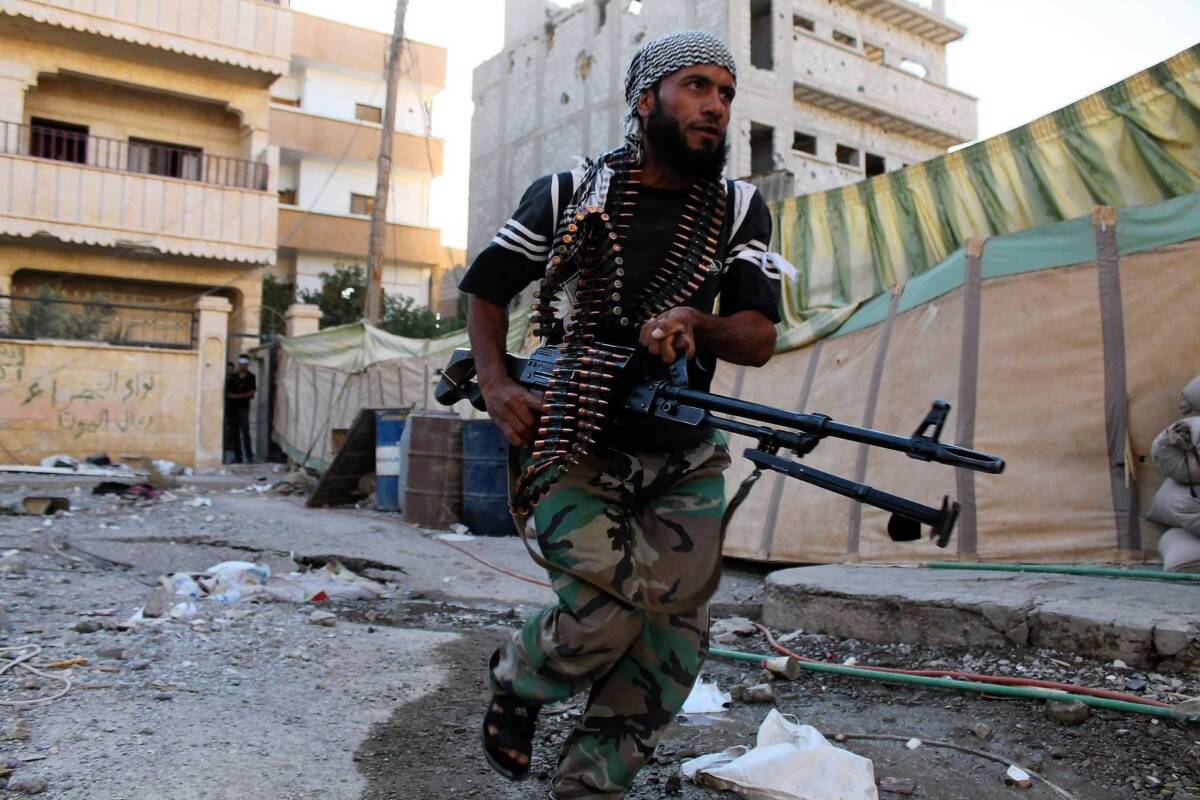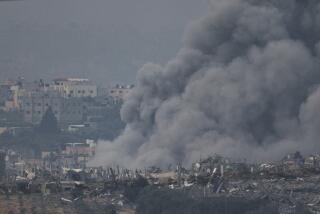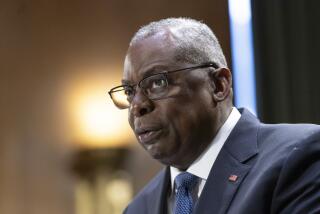Clashes rage on in Syria despite chemical arms deal

BEIRUT — Clashes flared across Syria on Sunday, and mortar shells fell on Damascus, highlighting a violent and intractable reality: The nation’s bloody civil war is no closer to resolution, despite a landmark U.S.-Russia deal designed to rid Syria of chemical armaments.
Various officials, including U.S. Secretary of State John F. Kerry, acknowledged that the chemical weapons accord, while significant, will probably do little in the short term to stop the killing, overwhelmingly the result of conventional weapons — bullets and artillery shells, bombs and rockets. The fighting on the ground in Syria and the much-heralded chemical weapons accord appear to be advancing on different tracks.
Opposition leaders, human rights advocates and others have tried to shift the focus back to the war and the ongoing carnage. Meantime, U.S. and other officials moved to allay concerns that the bigger picture was being lost in the hoopla surrounding the agreement.
“I say to the Syrian opposition and all those in Syria who recognize that just removing the chemical weapons doesn’t do the job: We understand that,” Kerry said during a visit to Jerusalem designed in part to build support for the U.S.-Russian initiative. “That is not all we are going to seek to do. But it is one step forward.”
A high-ranking Syrian official told a Russian interviewer that Saturday’s chemical weapons accord was a “victory” for Damascus.
The agreement, analysts said, could be a plus for Syrian President Bashar Assad, whose dramatic concession on chemical weapons may have averted a punishing U.S. strike, as well as for the White House. U.S. officials see the possibility of eliminating Syria’s chemical stockpiles without having to resort to planned military strikes that were not designed to destroy Syria’s toxic arsenal.
The armed Syrian opposition voiced bitter discontent with a deal that seemed to rule out long-anticipated U.S. airstrikes, which could provide a military boost for fragmented and outgunned rebel forces. The Obama administration’s chemical weapons “red line” — always viewed in Damascus and Moscow as a potential pretext for a Western-led attack — could become irrelevant if the government of Assad no longer possesses chemical weapons capability.
The U.S.-backed Syrian National Coalition, an opposition umbrella group, called Sunday for bans on government use of air power and ballistic missiles. The proposals would appear to have little chance of becoming reality as the delicate chemical arms pact is under global scrutiny and makes its way to the United Nations.
Still, Western officials were framing the chemical weapons discussion as part of a broader effort to bring peace to Syria.
“We are faced with a very paradoxical situation,” French Foreign Minister Laurent Fabius told reporters. “On the one hand, we have to move to destroy these chemical weapons. But on the other hand, the death toll continues to rise daily in Syria. And so we need to focus on that as well, and find a political solution to the Syrian crisis.”
At the moment, there is no plausible talk of a cease-fire in Syria. Both sides in the conflict, and their outside patrons, including the United States, appear determined to fight on to some indeterminate end, despite broad backing for a “political solution.”
Some predict an uptick in arms supplies to both the rebels and the government as the chemical disarmament plan advances and foreign powers seek to mollify their Syrian proxies. Whether either side in the civil war will change tactics remains unclear.
On Sunday, the government and opposition spokesmen reported clashes in hot spots throughout Syria, including Damascus suburbs, the central province of Homs, the northern city of Aleppo and the southern province of Dara. The official news service reported that two people were wounded by mortar shells fired into Damascus by “terrorists,” the government’s standard term for armed rebels.
The news agency also reported that the army had cleared “terrorists” from the mostly Christian town of Maaloula, north of Damascus. Last week, rebels overran the town, renowned as one of the few places where Aramaic, the presumed language of Jesus, is still spoken.
The Syrian military has made advances in recent months against loosely aligned opposition forces, especially in the strategic province of Homs, a battleground since the outset of the civil war 2 1/2 years ago. But rebels retain nominal control of wide swaths of the country, including several suburbs of Damascus, the capital.
In the view of many experts, continuation of the bloody impasse seems the most likely immediate outcome.
“I think what we’ll be looking at now, until the end of the year, will be a fairly stable kind of stalemate,” said Shashank Joshi, a research fellow with the Royal United Services Institute, a London-based think tank. “In a broad sense we’ll see a continuation of the status quo.”
In Geneva, U.S. and Russian officials voiced optimism that the prospective chemical arms accord could spur peace negotiations, although how that would happen is unclear. There are few signs of the imminent rebirth of the Geneva peace process, sidelined now for more than a year.
A fundamental sticking point — the future of Assad — has blocked any progress on prospective talks. The U.S.-allied opposition insists that Assad must go, while the Russian-backed government in Damascus has no intention of negotiating its own demise. In fact, Assad has not ruled out the possibility of running for president again next year, when his term expires.
“I don’t see how Assad and the opposition are going to sit down and negotiate Assad’s quiet, soft departure,” said Rami G. Khouri, director of the Issam Fares Institute for Public Policy and International Affairs at the American University of Beirut. “It’s possible that the United States and the French, for instance, may step up aid to the rebels to enhance their abilities.”
The chemical weapons accord does give Assad some breathing space: The Syrian ruler has averted, at least for the moment, a U.S.-led foreign intervention, always his greatest fear. Washington is now committed to working with his government in implementing the chemical disarmament plan, a process that will last until at least mid-2014, an optimistic target date.
“To some small extent, I think Assad’s position may have been strengthened, as far as regime stability or at least some continuing of government is important to the success of this plan,” said Joshi, of the Royal United Services Institute. “They need to have government institutions in place, though that doesn’t necessarily mean Assad himself.”
In Syria, official commentators tended to view the deal as a kind of necessary evil, given the threat of a U.S. bombardment, even though Damascus faces the loss of a crucial strategic chip to its historic adversary, Israel.
“Yes, perhaps Syria gave up a weapon that deters Israel, paying a price to avoid the idiocy of the American giant,” one columnist wrote in Syria’s Thawra newspaper.
Syria’s minister of national reconciliation, Ali Haidar, welcomed the chemical weapons deal in an interview with the Russian state news agency RIA Novosti. “This is a victory for Syria, won thanks to our Russian friends,” he said.
The U.S.-Russian agreement would sideline threats of U.S. military strikes against Syria for what the United States says is the Assad government’s involvement in a poison gas attack outside Damascus last month that killed hundreds. Syria has denied any role in the incident and blamed antigovernment rebels.
“This effort is not just about securing chemical weapons in Syria,” Kerry said Sunday in Jerusalem. “Our focus now must remain on ending the violence, ending the indiscriminate killing, ending the creating of more and more refugees that is not only tearing Syria apart, but threatens the region itself.”
Times staff writer Edmund Sanders in Jerusalem and special correspondent Nabih Bulos in Beirut contributed to this report.
More to Read
Start your day right
Sign up for Essential California for news, features and recommendations from the L.A. Times and beyond in your inbox six days a week.
You may occasionally receive promotional content from the Los Angeles Times.






